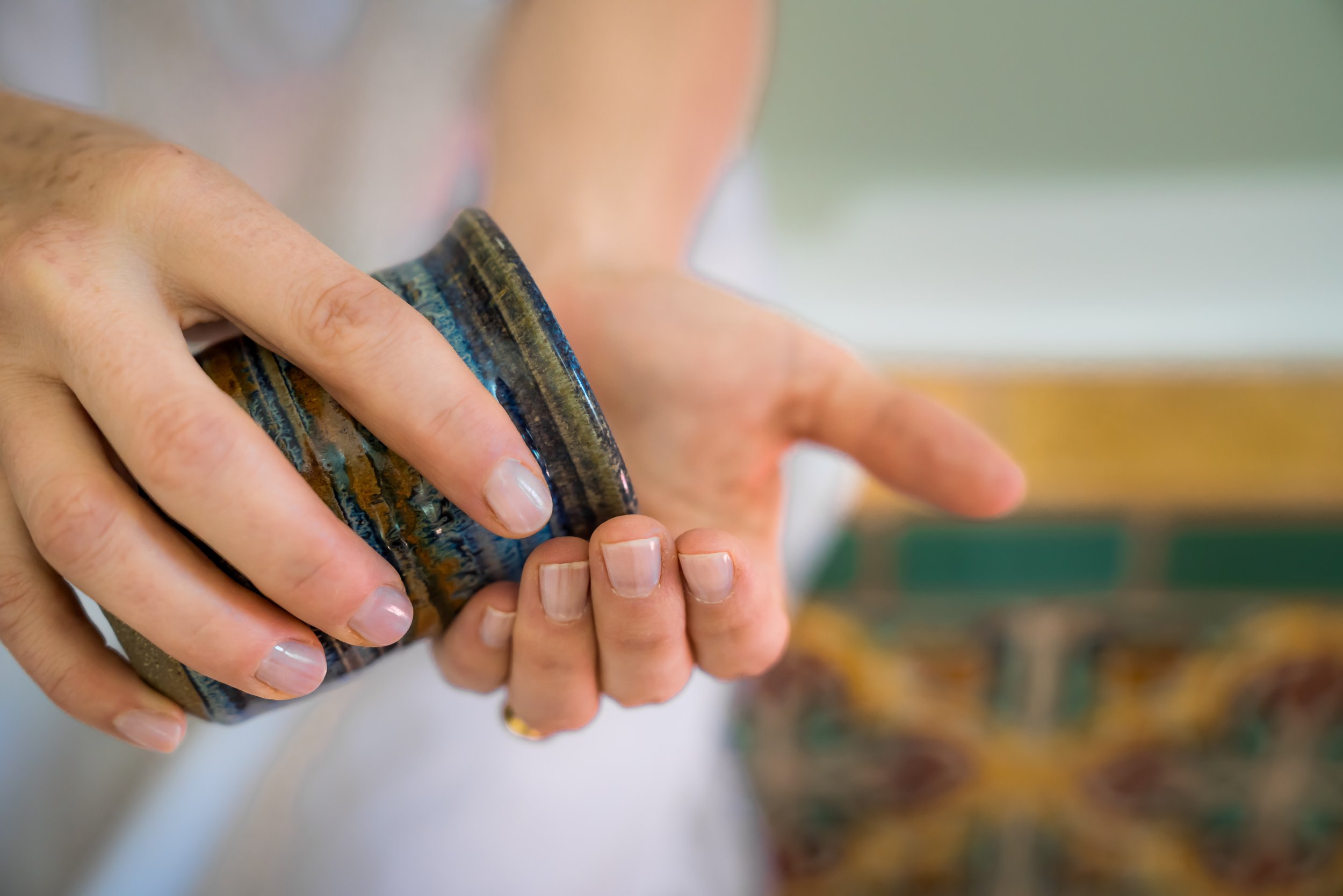an ayurvedic practice that will change your life
The body of one who uses oil massage regularly does not become affected much even if subjected to accidental injuries, or strenuous work. By using oil massage daily, a person is endowed with pleasant touch, trimmed body parts and becomes strong, charming and least affected by old age.
~ Charaka Samhita Vol. 1, V: 88-89
One of the easiest and most powerful traditional Ayurvedic practices you can do is Abhyanga - warm oil massage.
My teacher, Dr. Vasant Lad says that “a dry body, like a dry stick, breaks easily.”
When you apply oil, your body becomes more flexible and able to bend with the challenges of life, supporting you to feel nourished, grounded, and supple. This is an amazing practice for women before pregnancy, during pregnancy with modifications (see below), and especially important postpartum!
Benefits Of Abhayanga
Enhances health of the skin, makes it strong, soft & lustrous
Produces softness, strength and color in the body
Decreases the effects of aging & increases longevity
Bestows good vision
Promotes healthy appetite & strong digestion
Nourishes the body by removing toxins & providing nutrients to tissues
Supports restful sleep patterns
Strengthens the immunity, energy & vitality
Imparts a firmness to the limbs
Imparts tone and vigor to the dhatus (tissues) of the body
Maintains optimal body chemistry, including hormones & neurotransmitters
Calms the nervous system & sense organs
Reduces pain
Stimulates the internal organs of the body, including circulation
Balances elimination processes
Reduces coarseness, stiffness, roughness, fatigue and numbness
Nurtures & supports positive feelings & emotions
Benefits local veins & ligaments
Helps sciatica
Oiling the face removes facial wrinkles
Oiling the scalp causes hair to grow luxuriantly, thick, soft and glossy
Abhyanga for Vata
Sesame is considered to be the best choice of oil for vata because it is inherently warming (get it here). Almond Oil and mustard oil are also good choices because they are also warming. Vata massage oil (oil infused with specific herbs) is especially good if vata is high in your Vikruti (get it here). Vata massage oil can be used alone or added to sesame, almond or mustard oils.
*For increasing strength and stamina try Ashwagandha/Bala oil, get it here.
*If you're pregnant, we recommend sesame or almond oil.
Abhyanga for Pitta
Applying Bhringaraj Oil or Brahmi Oil to the scalp and soles of feet at bedtime may reduce pitta and encourage sound sleep. Herbal/Medicated “Pitta Massage Oil” from Banyan Botanicals is our choice, get it here. Sunflower and coconut oils are also good choices for pitta. If you spend a lot of time in the sun, you may want to add some Neem Oil to your basic abhyanga oil, as it reduces pitta in the skin (get it here).
*If you're pregnant, we recommend sunflower oil or coconut oil.
Abhyanga for Kapha
Sesame, corn, and mustard oils are all helpful for Kapha because they are warming, but herbal oils are an even better choice for Kapha, as they add more Kapha pacifying properties to the oil. Banyan's “Kapha Massage Oil” is a great choice, get it here.
*If you're pregnant, we recommend sesame oil.
Abhyanga in 2nd and 3rd Trimesters of Pregnancy
Follow the directions below, however, do not massage the oil in, simply spread it over your skin.
Allow the oil to soak in, and follow with a warm shower.
Do not do if there is any sign that the pregnancy is threatened in any way
Not recommended for the first trimester
Abhyanga Routine
Put about ½ cup oil in an 8 oz. glass bottle. Make sure the oil smells fresh and isn't rancid.
Place the bottle of oil in a pan of hot water until the oil is warm.
Sit or stand in a warm room, on an older towel (one you don't mind ruining with oil accumulation). Make sure you're protected from drafts.
Apply the oil to your entire body, and use a generous amount - 1/4-1/2 cup.
Massage the oil into your entire body, beginning at the extremities and working toward the middle of your body. Use long strokes on the limbs and circular strokes on the joints. Massage your abdomen and chest in broad, clockwise, circular motions. On your abdomen, follow the path of the large intestine; moving up on the right side of the abdomen, then across, then down on the left side.
Massage your body for 5-20 minutes, with love and patience. Don't rush this process!
Give a little extra time and attention to massaging the oil into your scalp, ears, and feet, at least once a week.
Apply oil to the crown of your head and work slowly out from there in circular strokes. Put a couple of drops of warm oil on the tip of your little finger and apply to the opening of the ear canal. (If there is any current or chronic discomfort in the ears don't do this without the recommendation of your health care practitioner).
When you massage your feet, be sure to wash them first when you shower, so you don't slip.
Enjoy a warm/hot bath or shower. You can use mild soap on the "strategic" areas, but it's best not to soap the oil off your skin. Enough will soak in and then rinse off so that you shouldn't need to use soap.
When you get out of the bath, towel dry. Keep a special towel for drying off after your Abhyanga because it can eventually get ruined, due to the accumulation of oil.
Put on a pair of cotton socks to protect your floors/carpets from the residual oil on your feet.
If you like, apply a dosha-appropriate essential oil to your wrists and neck.
Clean-up and Maintenance
Oil can accumulate in your tub and drain over time. A couple of times each month, pour approx. ¼ cup dish soap into the drain, then pour 2-3 cups of boiling water into the drain. Let sit for 15 min. Run hot water down the drain for a couple of minutes to flush out the residue. For laundering oily towels, add ¼ cup grease-cutting dish soap along with your regular laundry detergent. Let sit in very hot water for at least 30 minutes, then wash. You may need to repeat this. Experiment as needed. Caution: do not dry oily towels in a hot dryer as they are easily combustible and may catch fire. Oil towels stored together can build up internal heat in warm environments to the point of catching fire. Be sure to store them in well-ventilated, cool areas. Never store them in your vehicle trunk.
Contraindications for Abhyanga:
After eating and if there's indigestion
Acute conditions such as fever, chills, common cold, diarrhea, flu
Chronic, high systemic ama. This can show as a heavily coated tongue.
Immediately after taking emetics or purgatives
Under a doctor’s care for a medical condition
During pregnancy without consulting a health care practitioner or in threatened miscarriage
During menstrual cycle
Infected or open lesions
Edema (swelling)
Blood clots or bleeding disorders
Hangover
Extreme emotions
Acute hypoglycemia
Insulin-dependent diabetes
Dehydration
During chemotherapy

